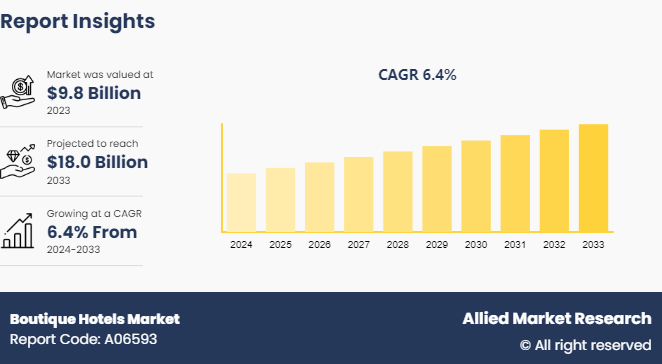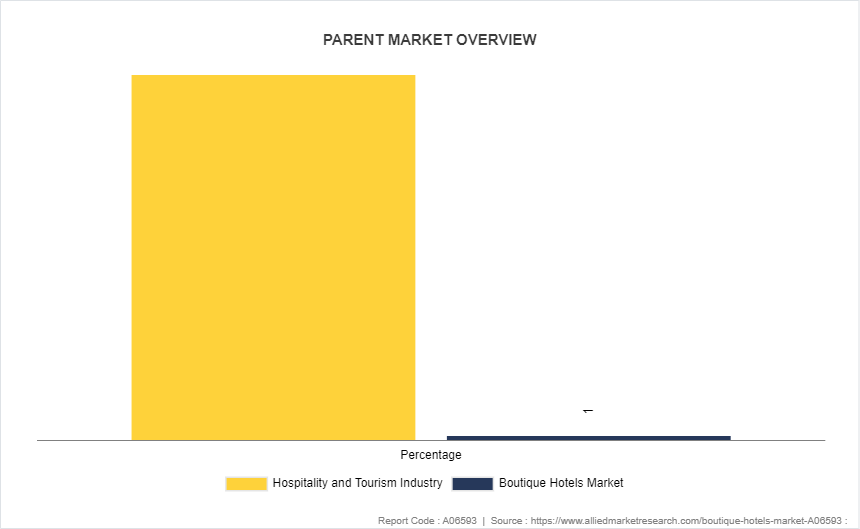Boutique Hotels Market Research, 2033
The global boutique hotels market size was valued at $9.8 billion in 2023, and is projected to reach $18.0 billion by 2033, growing at a CAGR of 6.4% from 2024 to 2033.

Market Introduction and Definition
Boutique hotels are compact, sophisticated lodging options that provide individualized attention and distinctive experiences. Known for their small size, usually between 10 and 100 rooms, these hotels prioritize fine architecture, unique features, and luxurious services. Boutique hotels, in contrast to big chain hotels, emphasize uniqueness and frequently capture the history and culture of the place they are located in. They provide tourists looking for lavish, customized trips with a personalized touch. The growing need for distinctive and memorable lodging experiences has led to a notable expansion of this specialized sector of the hospitality industry. They are a significant participant in the current hospitality landscape, propelled by trends like experiential travel, the rise of affluent tourists, and the desire for Instagram-worthy destinations.
Key Takeaways
The boutique hotels market study covers 20 countries. The research includes a segment analysis of each country in terms of value for the projected period.
More than 1, 500 product literatures, industry releases, annual reports, and other such documents of major boutique hotels industry participants along with authentic industry journals, trade associations' releases, and government websites have been reviewed for generating high-value industry insights.
The study integrated high-quality data, professional opinions and analysis, and critical independent perspectives. The research approach is intended to provide a balanced view of global markets and assist stakeholders in making educated decisions to achieve their most ambitious growth objectives.
Key market dynamics
Several?significant factors are driving the dynamic shifts that are occurring in the boutique hotel industry. Growing consumer demand for customized and distinctive travel experiences is one of the main driving forces. Millennials and Gen Z, in particular, like boutique hotels due to their distinctive characteristics, cozy settings, and personalized treatment, which sets them apart from huge hotel chains' mass-produced options. Travelers' use of social media to share their unique experiences encourages others to seek out similar experiences, which accelerates this change further.
The dynamics of the market are greatly impacted by technological developments. Personalized experiences and efficient guest services have been made possible by improved online booking platforms and the incorporation of AI and IoT into hotel operations. Boutique hotels use these technologies to improve tourist pleasure and loyalty by providing personalized recommendations, customized amenities, and easy check-in & check-out procedures.
The increased focus on environmental friendliness and sustainability is another important factor for increasing boutique hotels market share. In terms of implementing sustainable measures, such as?utilizing products manufactured locally, cutting waste, and encouraging environmentally friendly activities, boutique hotels frequently set the standard. This enhances the attraction of boutique lodgings even more as they are in line with the beliefs of ecologically conscious visitors.
The market is further influenced by consumers' growing inclination to experience travel. Immersion cultural experiences are more?in demand, and boutique hotels are in a good position to offer them. These hotels give visitors a closer connection to the location by incorporating components of the local tradition and culture into their activities, food, and design.
In addition, strategic alliances and joint ventures in the travel and tourism sector have expanded the boutique hotels' profiles and improved their accessibility. Boutique hotels tap into new market segments and reach a wider audience through partnerships with lifestyle brands, travel agencies, and online travel agents (OTAs) .
Lastly, shorter stays and domestic travel have increased since the pandemic, which is good news for boutique hotels that accommodate people seeking last-minute getaways and provide flexible booking choices. Boutique hotels are well-positioned in the changing hospitality sector due to their flexibility and distinctive offers.
Parent Market Overview of the Global Boutique Hotels Market
The market for boutique hotels globally is a niche segment of the larger hospitality and tourist sector. This parent market includes a broad variety of housing options, each meeting the needs and tastes of different types of travelers, including?resorts, budget hotels, and luxury hotels. Global tourism, the rise in disposable incomes, and change in consumer tastes for unique & immersive travel are some of the drivers that drive the growth of the hospitality sector. Boutique hotels take advantage of the growing trend toward customized travel experiences by showcasing their unique design, intimate size, and personalized service. They are impacted by the broader market's emphasis on innovation, sustainability, and technological integration, which propels boutique hotels market growth and distinctiveness in this competitive environment.

Market Segmentation
The boutique hotels market is segmented into the type, booking channel, tourist type, tour type, gender, age group, and region. On the basis of the type, the market is categorized into business hotels, suite hotels, airport hotels, resorts hotels, and others. Depending on the booking channel, it is segregated into phone booking, online booking, and in person booking. Based on tourist type, the market is bifurcated into domestic and international. On the basis of the tour type, the market is fragmented into independent traveler, package traveler, and tour group. Depending on the gender, the market is bifurcated into men and women. By age group, the market is classified into 15-25 Years, 26-35 Years, 36-45 Years, 46-55 Years, and 66-75 Years. Region wise, it is studied across North America (U.S., Canada, and Mexico) , Europe (Germany, Spain, UK, Italy, France, Switzerland, and the rest of Europe) , Asia-Pacific (India, China, Japan, Australia, and the rest of Asia-Pacific) , and LAMEA (Latin America, Middle East, and Africa) .
Regional/Country Market Outlook
The market for boutique hotels varies significantly by region. The U.S. leads North America in terms of the strong boutique hotels market demand, which is fueled by major cities like New York and Los Angeles where tourists are looking for distinctive, localized experiences. Europe, especially France, Italy, and the UK, is experiencing rapid market expansion as a result of its historical attractiveness and rich cultural legacy, which boutique hotels successfully capitalize on.
Countries in the Asia-Pacific region, such as Thailand and Japan, are expanding rapidly as tourists gather to enjoy unique cultural experiences. Meanwhile, as tourism infrastructure develops and attracts more foreign tourists looking for customized accommodation experiences, rising markets in Latin America and Africa, especially in places like Buenos Aires and Cape Town, are beginning to gain traction.
Industry Trends:
In February 2024, Hilton Hotels & Resorts announced plans to buy a California-based boutique hotel chain to increase the size of its portfolio in the boutique luxury market.
In January 2024, the launch of a boutique hotel featuring a combination of contemporary luxury and traditional Chinese design features in Shanghai's historic area was announced by Shangri-La Hotels and Resorts.
In December 2023, Minor Hotels announced that it has expanded its presence in the boutique luxury market by acquiring a group of boutique hotels located in several countries in the Asia-Pacific region.
Competitive Landscape
The major players operating in the boutique hotels market include Nine Hours, Container Hotels, Tubohotel, The Pod Hotel, Rolling Huts Boutique Hotels, Koyasan Guest House, Yotel Hotels, and Others.
Recent Key Strategies and Developments
According to boutique hotels market forecast, in January 2024, two new hotels were added in Nepal by RARE India, a network of boutique, planet-sensitive, immersive, community-inclusive, and owner-run lodging establishments. Two examples of these are the Nepali Ghar Hotel in Kathmandu and the Sanctuary Resort in Chitwan.
As per boutique hotels market statistics, in March 2024, the well-known boutique hotel Aria Hotel Budapest was once again chosen as the top hotel in Hungary. The World Travel Awards, termed the "Touristic Oscars" by the Wall Street Journal, counted online votes to make their choices. To succeed in the hospitality industry, the boutique hotel's owner acknowledged that providing visitors with honest and open communication is essential.
Key Sources Referred
Boutique & Lifestyle Leaders Association (BLLA)
Small Luxury Hotels of the World (SLH)
The Leading Hotels of the World (LHW)
Relais & Châteaux
Historic Hotels of America
Luxury Boutique Hotels & Resorts (LBHR)
National Association of Independent Hotels & Serviced Apartments (NAIHSA)
International Association of Boutique and Lifestyle Hotels (IABLH)
Key Benefits For Stakeholders
- This report provides a quantitative analysis of the market segments, current trends, estimations, and dynamics of the boutique hotels market analysis from 2023 to 2033 to identify the prevailing boutique hotels market opportunities.
- The market research is offered along with information related to key drivers, restraints, and opportunities.
- Porter's five forces analysis highlights the potency of buyers and suppliers to enable stakeholders make profit-oriented business decisions and strengthen their supplier-buyer network.
- In-depth analysis of the boutique hotels market segmentation assists to determine the prevailing market opportunities.
- Major countries in each region are mapped according to their revenue contribution to the Global market.
- Market player positioning facilitates benchmarking and provides a clear understanding of the present position of the market players.
- The report includes the analysis of the regional as well as Global boutique hotels market trends, key players, market segments, application areas, and market growth strategies.
Boutique Hotels Market Report Highlights
| Aspects | Details |
| Market Size By 2033 | USD 18.0 Billion |
| Growth Rate | CAGR of 6.4% |
| Forecast period | 2024 - 2033 |
| Report Pages | 250 |
| By Type |
|
| By Booking Channel |
|
| By Tourist Type |
|
| By Tour Type |
|
| By Gender |
|
| By Age Group |
|
| By Region |
|
| Key Market Players | Nine Hours, Yotel Hotels, Rolling Huts Boutique Hotels, The Pod Hotel, Container Hotels, Tubohotel, Koyasan Guest House |
The boutique hotels market is experiencing significant growth globally, driven by evolving consumer preferences for unique, personalized, and experiential stays. Travelers are increasingly seeking authentic local experiences, which boutique hotels provide through distinct designs, local culture integration, and personalized services. Sustainability is a key trend, with many boutique hotels adopting eco-friendly practices and sustainable designs to appeal to environmentally conscious travelers. T
The leading application of the boutique hotels market is to provide a unique and personalized lodging experience for guests seeking more than just a place to stay. Boutique hotels cater to travelers who value individuality, distinctive design, and intimate atmospheres, often reflecting the local culture and heritage. These hotels emphasize high-quality service, customized amenities, and a personalized approach, making them particularly appealing to luxury travelers, couples, and business profess
The largest regional market for boutique hotels is North America, particularly the United States. The region's robust travel and tourism industry, coupled with a high demand for personalized and unique lodging experiences, drives the growth of boutique hotels. Cities like New York, Los Angeles, and Miami are major hotspots, attracting both domestic and international travelers seeking distinctive accommodations. The presence of a strong luxury travel market and a growing trend towards experientia
The boutique hotels market was valued at $9.8 Billion in 2023, and is estimated to reach $18.0 Billion by 2033, growing at a CAGR of 6.4% from 2024 to 2033.
Several companies dominate the boutique hotel market by holding significant market shares. These include renowned brands like Marriott International with its Autograph Collection and The Ritz-Carlton, AccorHotels with its MGallery and SO/ brands, and Hyatt Hotels Corporation with the Andaz and Alila brands. Other notable players are IHG (InterContinental Hotels Group) with Kimpton Hotels & Restaurants, and Hilton Worldwide with its Curio Collection and Canopy by Hilton. These companies have esta
Loading Table Of Content...


